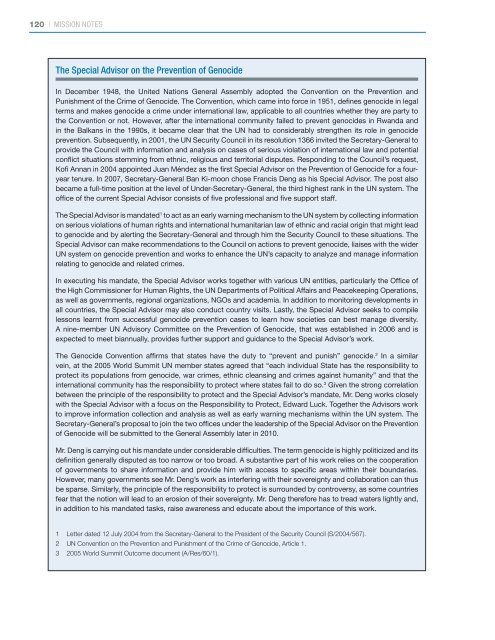here - Center on International Cooperation - New York University
here - Center on International Cooperation - New York University
here - Center on International Cooperation - New York University
You also want an ePaper? Increase the reach of your titles
YUMPU automatically turns print PDFs into web optimized ePapers that Google loves.
120 | Missi<strong>on</strong> NotesThe Special Advisor <strong>on</strong> the Preventi<strong>on</strong> of GenocideIn December 1948, the United Nati<strong>on</strong>s General Assembly adopted the C<strong>on</strong>venti<strong>on</strong> <strong>on</strong> the Preventi<strong>on</strong> andPunishment of the Crime of Genocide. The C<strong>on</strong>venti<strong>on</strong>, which came into force in 1951, defines genocide in legalterms and makes genocide a crime under internati<strong>on</strong>al law, applicable to all countries whether they are party tothe C<strong>on</strong>venti<strong>on</strong> or not. However, after the internati<strong>on</strong>al community failed to prevent genocides in Rwanda andin the Balkans in the 1990s, it became clear that the UN had to c<strong>on</strong>siderably strengthen its role in genocidepreventi<strong>on</strong>. Subsequently, in 2001, the UN Security Council in its resoluti<strong>on</strong> 1366 invited the Secretary-General toprovide the Council with informati<strong>on</strong> and analysis <strong>on</strong> cases of serious violati<strong>on</strong> of internati<strong>on</strong>al law and potentialc<strong>on</strong>flict situati<strong>on</strong>s stemming from ethnic, religious and territorial disputes. Resp<strong>on</strong>ding to the Council’s request,Kofi Annan in 2004 appointed Juan Méndez as the first Special Advisor <strong>on</strong> the Preventi<strong>on</strong> of Genocide for a fouryeartenure. In 2007, Secretary-General Ban Ki-mo<strong>on</strong> chose Francis Deng as his Special Advisor. The post alsobecame a full-time positi<strong>on</strong> at the level of Under-Secretary-General, the third highest rank in the UN system. Theoffice of the current Special Advisor c<strong>on</strong>sists of five professi<strong>on</strong>al and five support staff.The Special Advisor is mandated 1 to act as an early warning mechanism to the UN system by collecting informati<strong>on</strong><strong>on</strong> serious violati<strong>on</strong>s of human rights and internati<strong>on</strong>al humanitarian law of ethnic and racial origin that might leadto genocide and by alerting the Secretary-General and through him the Security Council to these situati<strong>on</strong>s. TheSpecial Advisor can make recommendati<strong>on</strong>s to the Council <strong>on</strong> acti<strong>on</strong>s to prevent genocide, liaises with the widerUN system <strong>on</strong> genocide preventi<strong>on</strong> and works to enhance the UN’s capacity to analyze and manage informati<strong>on</strong>relating to genocide and related crimes.In executing his mandate, the Special Advisor works together with various UN entities, particularly the Office ofthe High Commissi<strong>on</strong>er for Human Rights, the UN Departments of Political Affairs and Peacekeeping Operati<strong>on</strong>s,as well as governments, regi<strong>on</strong>al organizati<strong>on</strong>s, NGOs and academia. In additi<strong>on</strong> to m<strong>on</strong>itoring developments inall countries, the Special Advisor may also c<strong>on</strong>duct country visits. Lastly, the Special Advisor seeks to compileless<strong>on</strong>s learnt from successful genocide preventi<strong>on</strong> cases to learn how societies can best manage diversity.A nine-member UN Advisory Committee <strong>on</strong> the Preventi<strong>on</strong> of Genocide, that was established in 2006 and isexpected to meet biannually, provides further support and guidance to the Special Advisor’s work.The Genocide C<strong>on</strong>venti<strong>on</strong> affirms that states have the duty to “prevent and punish” genocide. 2 In a similarvein, at the 2005 World Summit UN member states agreed that “each individual State has the resp<strong>on</strong>sibility toprotect its populati<strong>on</strong>s from genocide, war crimes, ethnic cleansing and crimes against humanity” and that theinternati<strong>on</strong>al community has the resp<strong>on</strong>sibility to protect w<str<strong>on</strong>g>here</str<strong>on</strong>g> states fail to do so. 3 Given the str<strong>on</strong>g correlati<strong>on</strong>between the principle of the resp<strong>on</strong>sibility to protect and the Special Advisor’s mandate, Mr. Deng works closelywith the Special Advisor with a focus <strong>on</strong> the Resp<strong>on</strong>sibility to Protect, Edward Luck. Together the Advisors workto improve informati<strong>on</strong> collecti<strong>on</strong> and analysis as well as early warning mechanisms within the UN system. TheSecretary-General’s proposal to join the two offices under the leadership of the Special Advisor <strong>on</strong> the Preventi<strong>on</strong>of Genocide will be submitted to the General Assembly later in 2010.Mr. Deng is carrying out his mandate under c<strong>on</strong>siderable difficulties. The term genocide is highly politicized and itsdefiniti<strong>on</strong> generally disputed as too narrow or too broad. A substantive part of his work relies <strong>on</strong> the cooperati<strong>on</strong>of governments to share informati<strong>on</strong> and provide him with access to specific areas within their boundaries.However, many governments see Mr. Deng’s work as interfering with their sovereignty and collaborati<strong>on</strong> can thusbe sparse. Similarly, the principle of the resp<strong>on</strong>sibility to protect is surrounded by c<strong>on</strong>troversy, as some countriesfear that the noti<strong>on</strong> will lead to an erosi<strong>on</strong> of their sovereignty. Mr. Deng t<str<strong>on</strong>g>here</str<strong>on</strong>g>fore has to tread waters lightly and,in additi<strong>on</strong> to his mandated tasks, raise awareness and educate about the importance of this work.1 Letter dated 12 July 2004 from the Secretary-General to the President of the Security Council (S/2004/567).2 UN C<strong>on</strong>venti<strong>on</strong> <strong>on</strong> the Preventi<strong>on</strong> and Punishment of the Crime of Genocide, Article 1.3 2005 World Summit Outcome document (A/Res/60/1).
















